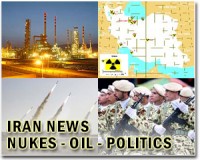 |
Vienna (AFP) Jan 14, 2011 Iran's invitation to a number of key countries to visit its nuclear sites has effectively been snubbed by major powers, diplomats here said Friday. Diplomats close to the International Atomic Energy Agency (IAEA) told AFP that only a small number of countries had signalled their participation in the tour this weekend, including Algeria, Cuba, Egypt, Syria and Venezuela. But other countries, such as China or Russia, had not given any official response, diplomats said, speaking on condition of anonymity. Nevertheless, comments from their capitals appeared to indicate they would not be taking part. Tehran's envoy to the IAEA, Ali Asghar Soltanieh, told the Iranian news agency ISNA that representatives of the so-called Non-Aligned Movement (NAM), developing countries, the Arab League, Venezuela and Syria had accepted invitations to visit Iran's central Natanz enrichment facility and its still-unfinished heavy water reactor at Arak. Egypt is the current head of the NAM and the G77 developing countries are represented by Algeria. Nevertheless, in Moscow on Thursday, Russian Foreign Minister Sergei Lavrov said that while Iran's invitation "deserved attention," such a trip could not replace IAEA inspections. And in Beijing, foreign ministry spokesman Hong Lei said China's "Vienna representative is still at home right now, so it will be difficult for him to go", which was also effectively seen as a snub. According to diplomatic sources in Vienna, Iran sent out invitations earlier this month to a number of IAEA member countries, including Russia, China, Egypt and Cuba, as well as to Hungary as rotating president of the European Union, to visit its main nuclear facilities. Iran's atomic chief Ali Akbar Salehi saw the move as a confidence-building initiative. "No country in the world will show its nuclear installations to others and this is a sign that Iran's nuclear activities are peaceful," Salehi told ISNA, adding that Iran had also welcomed "nuclear experts" to join in the tour. Such visits are indeed rare. The last trip that Tehran arranged for members of the IAEA was in February 2007. However, western powers, such as the United States, Britain, France and Germany, were not invited. And the EU declined the invitation, saying the IAEA "are the people who have to inspect the Iranian nuclear facilities." Iran's unusual invitation came in the run-up to talks with six world powers at the end of next week in Turkey chaired by the EU's foreign policy chief Catherine Ashton. Britain, China, France, Russia, the United States and Germany are to meet with Iran for another round of talks on Tehran's atomic programme in Istanbul on January 21-22. The previous round of talks, after a 14-month hiatus, was held in Geneva on December 6-7. Western powers suspect that Iran wants to use its uranium enrichment activities to build a nuclear bomb. Tehran denies the charge, insisting its programme is a peaceful effort to producing nuclear energy. Ashton is currently in Istanbul to prepare for the meeting. Asked about her expectations, she replied: "Our purpose in meeting is to now look for tangible credible ways to make a move forward." Iran is under four sets of sanctions by the United Nations over its refusal to suspend uranium enrichment, one of the most sensitive parts of its atomic programme because enriched uranium can be used not only to make nuclear fuel, but also the fissile material for a bomb.
Share This Article With Planet Earth
Related Links Learn about nuclear weapons doctrine and defense at SpaceWar.com Learn about missile defense at SpaceWar.com All about missiles at SpaceWar.com Learn about the Superpowers of the 21st Century at SpaceWar.com
 Iran says no talks on 'nuclear dossier' at Istanbul
Iran says no talks on 'nuclear dossier' at IstanbulTehran (AFP) Jan 12, 2011 Iran will not talk about its "nuclear dossier" at the Istanbul talks with world powers, atomic chief Ali Akbar Salehi said in comments published Wednesday, reiterating Tehran's long-standing policy. "We will absolutely not recognise the negotiation if the other side wants to negotiate on the issue of the nuclear dossier" of Iran, Salehi, who is also acting foreign minister, said in an interv ... read more |
|
| The content herein, unless otherwise known to be public domain, are Copyright 1995-2010 - SpaceDaily. AFP and UPI Wire Stories are copyright Agence France-Presse and United Press International. ESA Portal Reports are copyright European Space Agency. All NASA sourced material is public domain. Additional copyrights may apply in whole or part to other bona fide parties. Advertising does not imply endorsement,agreement or approval of any opinions, statements or information provided by SpaceDaily on any Web page published or hosted by SpaceDaily. Privacy Statement |